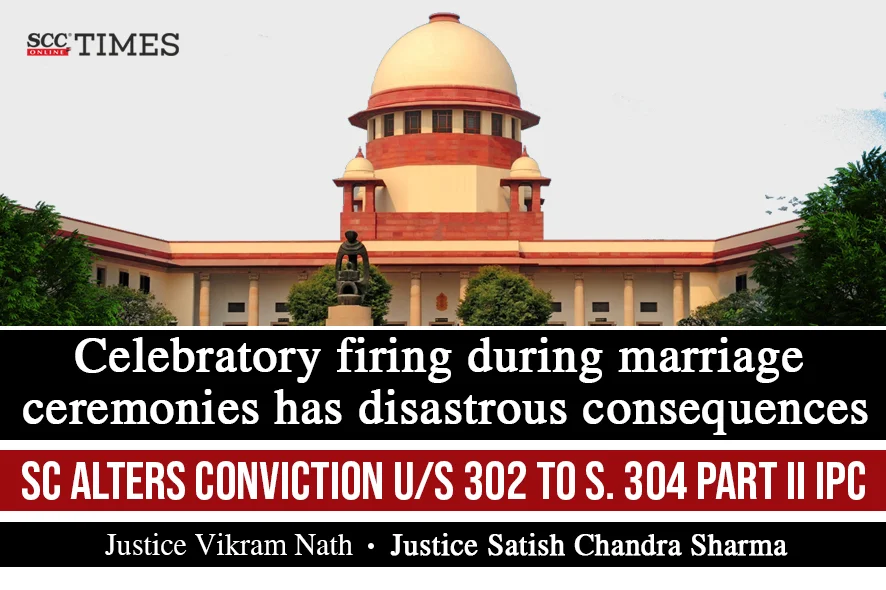Supreme Court: In a criminal appeal against Allahabad High Court’s decision, whereby the convict’s application against his conviction and life imprisonment sentence by the Trial Court for offence under Section 302 of the Penal Code, 1860 (‘IPC’) and five years rigorous imprisonment for offence under Sections 25/ 27 of the Arms Act, 1959 (‘Arms Act’) was dismissed, the Division Bench of Vikram Nath and Satish Chandra Sharma*, JJ. allowed the appeal and altered the conviction to offence under Section 299 of the IPC i.e., punishable under Section 304 Part II of the IPC.
In the matter at hand, a First Information Report (‘FIR’) was lodged by the village chowkidar stating that on 17-03-2016, in a marriage ceremony, the convict shot the deceased, which resulted in an injury on his neck and ultimately led to his demise on the spot itself. After the investigation, a charge-sheet was filed, and the case was committed to the Trial Court and charges were framed for an offence under Section 302 of the IPC and for offences punishable under Section 25/27 of the Arms Act.
The Trial Court found the convict guilty of the said offences and sentenced him to undergo rigorous imprisonment for life with a fine of Rs. 10,000/- under Section 302 of the IPC and five years rigorous imprisonment under Sections 25/ 27 of the Arms Act with fine of Rs. 5,000/-. Subsequently, the High Court affirmed the Trial Court’s order.
The Court noted the recovery of a weapon along with cartridge from the convict was proved before the Trial Court. The Court said that it was an undisputed fact that the deceased died on account of a single bullet injury and that there was no known prior enmity between the deceased and the accused.
On the question that whether the convict’s act of engaging in celebratory firing during a marriage ceremony could be construed to be an act so imminently dangerous so as to, in all probability, cause death or such bodily injury as was likely to cause death, the Court said that the act of celebratory firing during marriage ceremonies is an unfortunate yet prevalent practice in our nation. The Court called the present case a direct example of the disastrous consequences of such uncontrolled and unwarranted celebratory firing.
The Court said that the convict opened fire in a crowded place, i.e., a marriage ceremony without taking reasonable measures for safety, which led to the unfortunate demise of the deceased. The Court referred to Kunwar Pal Singh v. State of Uttarakhand, (2014) 12 SCC 434, wherein, on the similar line of facts, the Court held that the appellant therein, was guilty of committing the act which caused the death of the deceased since the act was done with the knowledge that is it likely to cause death within the meaning of Section 304 Part II of the IPC, however, the sentence imposed upon the appellant was reduced to a period of seven years without making any alteration in the fine amount imposed by the Trial Court and confirmed by the High Court.
The Court upon considering the totality of circumstances of the case i.e., that there was no previous enmity between the deceased and the convict; no intention to cause death of the deceased and the position of law enunciated in Kunwar Pal Singh (Supra), found the convict as guilty of commission of ‘culpable homicide’ within the meaning of Section 299 of the IPC i.e., punishable under Section 304 Part II of the IPC. Thus, the Court allowed the appeal and set aside the conviction and sentence of the convict under Section 302 of the IPC is set aside. The Court noted the accused had already undergone about eight years of imprisonment. The Court held that the conviction and sentence under Sections 25 and 27 of the Arms Act remains unaltered. Resultantly, the Court directed for the release of the convict forthwith, if not required in any other case.
[Shahid Ali v. State of U.P., 2024 SCC OnLine SC 259, Decided on: 11-03-2024]
*Judgment Authored by: Justice Satish Chandra Sharma
Know Thy Newly Appointed Supreme Court Judge | Justice Satish Chandra Sharma








